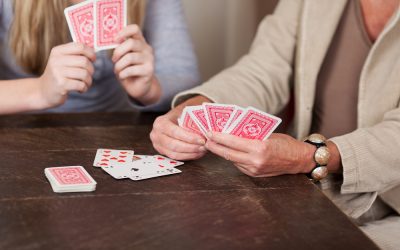Where Seniors Rule the Table at Your Senior Living Facility
One of the most enriching and engaging activities for seniors in a senior living facility is playing classic bridge card games.
With its perfect blend of strategy, social interaction and friendly competition, bridge offers numerous benefits for seniors and can be the ideal addition to any activity calendar for seniors.
We will explore the many advantages of playing bridge, provide step-by-step instructions for newcomers to learn the game, and offer tips on how to organize tournaments and engaging activities that will have seniors at your facility ruling the tables in no time!
Benefits of Playing Bridge for Seniors
Are you searching for an engaging and enjoyable activity to enhance the lives of seniors at your senior living facility? Look no further than bridge card games!
This timeless pastime offers a perfect blend of mental stimulation, social interaction, and friendly competition that can significantly enrich the daily experiences of seniors in your community.
Whether they are lifelong bridge enthusiasts or newcomers to the game, residents will discover an array of benefits that make playing bridge an ideal addition to your facility’s activities calendar.
One of the most significant advantages of playing bridge for seniors is the mental stimulation it provides. As a strategic game that requires critical thinking, memory, and problem-solving skills, bridge serves as a mental workout, helping seniors keep their cognitive abilities sharp and agile. Additionally, the game of bridge can improve concentration and focus, which can be valuable assets in other aspects of life as well.
Beyond the mental benefits, bridge also fosters social connections and camaraderie among players. The game is played in pairs, promoting teamwork, communication, and a sense of belonging.
Regularly participating in bridge games allows seniors to forge new friendships and strengthen existing bonds, combating feelings of isolation and loneliness that can sometimes arise in senior living facilities.
By incorporating bridge into your activities lineup, you’ll be providing residents with a fun, engaging, and enriching experience that promotes both mental and emotional well-being.

Mental Stimulation
Playing bridge regularly is an excellent way for seniors to maintain and improve their cognitive skills. As a game that requires critical thinking, strategy, and memory, bridge exercises the brain, helping to keep it sharp and agile.
Social Interaction
Bridge is a game played in pairs, which encourages social interaction and fosters camaraderie among participants. Regularly engaging with others in a social setting can help combat feelings of isolation and loneliness, contributing to overall emotional well-being.
Stress Relief
Playing bridge can be a relaxing and enjoyable way to unwind. By focusing on the game, seniors can take their minds off daily worries and stresses, providing an outlet for relaxation and mental respite.
Sense of Achievement
As players become more skilled at bridge, they can experience a sense of achievement and personal satisfaction. This boost in self-esteem can lead to increased confidence and happiness in other areas of life.
Improved Concentration and Focus
The strategic nature of the game of bridge demands focus and concentration from its players. Regularly practicing these skills can help seniors maintain and enhance their overall attention span.
Enhanced Communication Skills
Bridge requires effective communication between partners to succeed. By regularly engaging in this cooperative game, seniors can refine their listening and verbal skills, which can benefit them in other aspects of their lives as well.
How to Play Bridge
Bridge is a card game played with a standard deck of 52 cards, divided into four suits: hearts, diamonds, clubs, and spades. There are two main parts to the game: bidding and playing the hand.
Bidding
Each player is dealt 13 cards, and the goal of the bidding phase is for players to determine the “contract” for the hand. A contract consists of a number of tricks (minimum of seven) and a suit that will be the trump suit for that hand (or no trump, if specified).
Bidding starts with the dealer and moves clockwise around the table. Players communicate their hand strength and suit preferences by making “bids.” Each bid must be higher than the previous one, either by increasing the level (number of tricks) or choosing a higher-ranking suit.
The bidding continues until three consecutive passes occur, at which point the last bid becomes the contract. The team that won the bidding becomes the “declaring” team, and the player who first mentioned the trump suit (or no trump) becomes the “declarer.”
Playing the Hand
The player to the left of the declarer leads the first card, and the play moves clockwise around the table. Players must follow suit if possible; if not, they can play any card. The highest card of the led suit or the highest trump card (if any are played) wins the trick.
The declarer’s partner, known as the “dummy,” lays their hand face-up on the table after the first trick. The declarer then plays both their own hand and the dummy’s hand. The team’s goal is to win at least the number of tricks specified in the contract.
Scoring
Scoring in bridge can be a bit complex, but it is an essential part of the game. Points are awarded based on the number of tricks won, the trump suit (or no trump), and whether the declaring team fulfilled their contract or not.
Additional points can be earned for winning more tricks than the contract requires, known as “overtricks.” Conversely, if the declarer’s team fails to make their contract, the defending team earns points.
There are many resources available for learning bridge scoring in detail, but as a beginner, it’s essential to focus on understanding the game’s basic mechanics first.

How to Get Residents Engaged with Bridge
Offer Beginner Classes
Many seniors may be new to the game or need a refresher on the rules of bridge card games. Offer beginner bridge classes to teach residents the fundamentals of the game in a friendly and supportive environment.
Establish Regular Game Sessions
Create a consistent schedule for bridge games at your senior living facility. This encourages residents to make bridge a regular part of their routine and helps create a sense of community among players.
Create a Bridge Club
Forming a bridge club provides seniors with a sense of belonging and camaraderie. Organize meetings, social events, and friendly competitions for club members to enhance the bridge experience.
Promote the Benefits
Educate residents about the numerous mental and social benefits of playing bridge. This can help encourage seniors who may not have considered participating in card games before to give bridge a try.
Encourage Peer-to-Peer Teaching
Bridge players often enjoy sharing their knowledge with others. Encourage experienced players to teach and mentor newcomers, fostering a supportive atmosphere for learning and improving.
Tips on Winning at Bridge
Focus on Communication
Effective communication with your partner is key to winning at bridge card games. Use the bidding phase to convey information about your hand and listen carefully to your partner’s bids.
Develop a Strong Bidding System
Having a well-defined bidding system with your partner can help you accurately assess each hand’s potential and make more informed decisions during the game.
Count Your Points
Evaluate the strength of your hand by counting high card points (HCP). This can help you determine whether your hand is strong enough to bid and how high you should bid.
Plan Your Play
Before starting to play, take a moment to analyze your hand and the dummy’s hand. Plan a strategy for how to take the required number of tricks to fulfill your contract.
Practice Defensive Techniques
Good defense can make all the difference in winning or losing a bridge game. Learn how to read your opponents’ plays, anticipate their strategies, and work together with your partner to defend effectively.
How to Organize Bridge Tournaments
Determine the Tournament Format
There are several popular tournament formats to choose from, such as round-robin, Swiss, or knockout bridge card games. Select the format that best suits the number of participants and the desired level of competitiveness.
Round-Robin Tournaments
In a round-robin tournament, each participant plays against every other participant in a series of matches. This format ensures that players have the opportunity to face off against multiple opponents, allowing for a more comprehensive assessment of each player’s skill level. Round-robin tournaments are particularly well-suited for smaller groups, as they provide ample opportunities for social interaction and friendly competition among participants. One downside to this format is that it can be time-consuming, particularly with larger groups, as the number of matches increases with each additional participant. However, the round-robin format remains a popular choice for bridge enthusiasts, as it guarantees a fair and balanced competition.
Swiss Tournaments
Swiss tournaments are designed to accommodate a large number of participants in a relatively short amount of time. In this format, players are paired against opponents with similar records, and the pairings are adjusted after each round based on the results. This ensures that players face opponents of similar skill levels, providing a more balanced and competitive experience. Swiss tournaments typically have a predetermined number of rounds, after which the players are ranked based on their win-loss records. Ties are usually broken using various tiebreak methods, such as the “Buchholz system,” which takes into account the strength of each player’s opponents. Swiss tournaments are favored for their efficiency and adaptability, as they can accommodate varying numbers of participants without significantly extending the tournament’s duration.
Knockout Tournaments
Knockout tournaments, also known as elimination tournaments, involve players facing off in a series of head-to-head matches, with the winner of each match advancing to the next round and the loser being eliminated from the competition. This format creates a sense of urgency and excitement, as players must win each match to continue in the tournament.
Knockout tournaments can be organized as single-elimination, where one loss results in elimination, or double-elimination, where players must lose twice before being eliminated. This format is ideal for creating a dramatic and competitive atmosphere, as each match carries significant importance. However, knockout tournaments can be less forgiving than round-robin or Swiss tournaments, as a single loss can result in elimination, potentially reducing the opportunities for social interaction and skill development.
Despite this, knockout tournaments remain a popular choice for bridge players seeking a thrilling and fast-paced competitive experience.
Set a Schedule
Plan the dates and times for the tournament, making sure to allow adequate time for participants to play their matches and rest between rounds.
Establish Tournament Rules
Create a clear set of rules and guidelines for the tournament, including scoring procedures, time limits, and any specific regulations for your senior living facility.
Promote the Tournament
Announce the tournament well in advance to give participants time to prepare and sign up. Use your activity calendar and newsletters, bulletin boards and social media to spread the word.
Arrange for Prizes and Recognition
Offer prizes or certificates for the top finishers in the tournament, and acknowledge all participants for their effort and sportsmanship.
Fun Bridge Activities for Your Facility’s Activities Calendar
Themed Bridge Nights
Organize special bridge nights with fun themes, such as “Casino Night,” “Roaring Twenties,” or “Hollywood Glamour.” Encourage residents to dress up according to the theme and provide themed snacks and decorations to create a festive atmosphere.
Bridge Workshops
Offer workshops that focus on specific aspects of the game, such as bidding, defense, or declarer play. This allows players to improve their skills in a targeted manner, enhancing their overall bridge experience.
Intergenerational Bridge Games
Invite family members, friends, or even local students to participate in intergenerational bridge games. This promotes bonding and provides an opportunity for seniors to share their knowledge and love of the game with younger generations.
Bridge Ladder Competitions
Organize a ladder competition in which players are ranked based on their performance in a series of games. As players improve, they can “climb” the ladder by challenging and defeating higher-ranked players. This format encourages friendly competition and offers motivation for continuous improvement.
Charity Bridge Events
Host a charity bridge tournament or game night, with proceeds benefiting a local nonprofit organization. This offers seniors the opportunity to enjoy their favorite game while contributing to a worthy cause.
Bridge and Tea Socials
Combine bridge games with an elegant afternoon tea, complete with finger sandwiches, scones, and pastries. This creates a delightful social event that enhances the bridge experience and promotes camaraderie among players.

Unleash Your Inner Card Sharks with Bridge Card Games
Introducing bridge to your senior living facility’s activities calendar is a fantastic way to provide residents with a mentally stimulating, socially engaging and enjoyable pastime.
By offering beginner classes, organizing tournaments and special events, and promoting the many benefits of playing bridge, you can create an environment in which seniors can unleash their inner card sharks and rule the table with confidence and skill.
With a little planning and enthusiasm, bridge can become a cornerstone of your facility’s social and recreational offerings, enriching the lives of seniors for years to come.
Learn more about our activity calendar and senior living newsletter services or book an appointment to discuss your publishing needs.




0 Comments